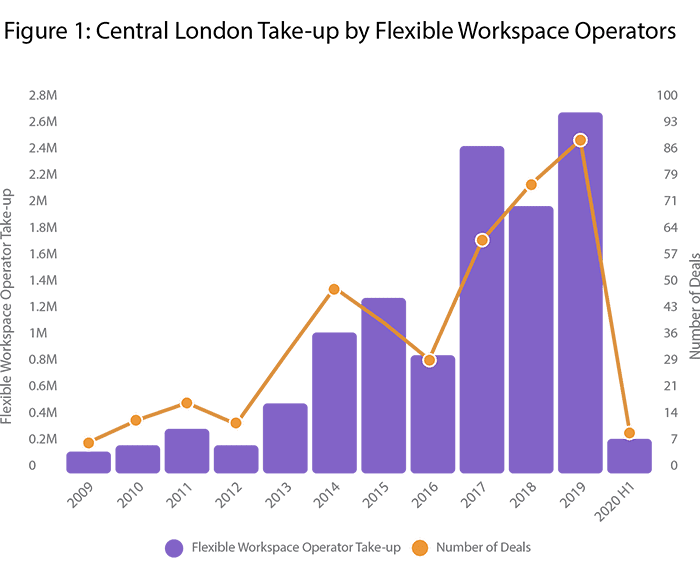Reimagining Flexible Office Spaces in 2021: What Makes Them Different

Summary – The pandemic may have shaken the work market and caused the priorities of people at work to change, but it has definitely changed for good. Flexible workspace with health and safety at its center is a great place to be for the operators, employers, and employees; and provide for the current scenario. Learn where it all leads in the future, here:
The last nine months have brought in a drastic change in how people across the world look at work, and workspaces are no different. There’s definitely no going back to the times when employees preferred luxurious, open shared spaces with included coffee/water corners and cafeterias before choosing a coworking space. Instead, Harvard Business School reports suggest that post-pandemic at least 16% of people would switch to working from their homes for at least two days per week. Now, this could mean worry for organizations with on-going, long-term leases for office spaces, but that doesn’t mean all is lost.
Yes, COVID-19 did pose a heavy blow on the work market worldwide, but the future looks productive nevertheless. People would now prefer to look for office spaces near the vicinity of their homes, as well as operate from less-crowded offices away from the city. This is exactly what flex spaces stand for, and companies can choose to have more of such spaces across different regions for better employee performance. As an employer or a coworking space owner, the way your office space is utilized needs change, for example, lower employee-to-washroom rations. Breathe easy, coworking spaces and offices are not going away entirely.
Understanding ‘Flexible’ Office Spaces
Back in the day, companies used to be pickier with getting spaces that were multifunctional. Currently, post-pandemic office spaces would be centered around creating smaller, multi-faceted, and thoughtfully utilized, flexible workspaces with short-term leases for individuals and enterprises alike. These workspaces would be driven by purpose, which focuses on the purpose of each employee’s presence; be it onboarding, training, meetings, or other occasional requirements; without having to cost a fortune for the organization.
Flexible office spaces are super-personalized, daily space rentals require little upfront capital from the employer, and symbolize safety as well as company culture to the employees. These spaces would also be equipped with a distributed space design strategy, ease, and convenience for your employees to choose from, as well as come enabled with state-of-the-art architectural safety designs to work disruption-free even in the face of a power outage, earthquakes, etc.

Credits: Cushman and Wakefield
Studies show that enterprises with geographically dispersed teams have been able to keep up with the productivity levels through Zoom calls, and flexible spaces need to preserve the same collaboration when the pandemic fades out. In fact, even when the vaccines are out, people may prefer to keep up the habit of social distancing when they’re at work. Therefore, that’s definitely something that flexible spaces need to deliver without saying.
Apart from the designs, well-ventilation and building up of clean, healthier workspace definitely top the list. For flexible workspace, designs need to incorporate efficient air-filtration systems, occupancy restrictions on elevators, washrooms.
The Next Normal
:
It may not be an overnight task, but employees will slowly return to office spaces once the office market adapts to the new requirements of the post-pandemic world. Something which falls flat upon the rigidity of the traditional office setup. For coworking spaces that make profitability out of maximum seatings, they’d need to build a business model based on sustainability and the well-being of the employees.
Not just that, flexible workspaces would bring together more judicious, and innovative use of spaces. One can use the hotdesks as the reception area, with open space settings; or can even turn quick breakout spaces into conference rooms with the latest technology for bringing together multiple teams over video calls.
Think about it, as people turn towards closer-to-homes, satellite workspaces, it would cut back on their commute times, reduce dependencies on public transport as well as support a cleaner air environment. This, in itself, can be a major advantage to combat air pollution as well as support smaller, suburban communities in terms of ‘business flow’ if the flexible spaces are located away from the cities.
As per the JLL report, by 2030 30% of all US office spaces would fall under the flexible workspace category, and have utilization rates up to 80%. The smaller operators would merge with the larger ones since it would be a capital-intense market that needs to leverage the inherent readiness and the agile work strategies of organizations. Something that the hospitality industry has been doing for a long time, pre-pandemic.
Apart from that, workspaces have also gone digital in 2020 and will continue to become more tech-focused until it builds a technologically enabled ecosystem with wearable, contactless technology that will again disrupt the work market with autonomous workspaces. AI-based facial recognition, real-time security, cloud-based access are some of the applications of such technologically superior workspaces that are already implemented into our daily work settings.
Bottom line
:
Necessity is the mother of invention, and in this case, it has caused coworking spaces to become completely integrated workspace solution providers for companies, rather than just being another space. In fact, the future looks bright for coworking spaces, where they will be the leading work experience creators, focused on building alliances, and community work requirements for all kinds of clients – from flexible to remote work settings.
At Zioks, we focus on bringing the right balance of safety, sustainability, and collaboration to the table with the help of our flexible workspaces that fit the bill with the current scenario. Being a co working space in Kolkata, we ensure the implementation of financial agility in our business model for enterprises across all scales. Drop in to say ‘Hi’ anytime!


